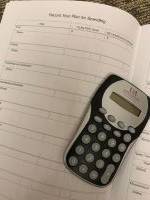Budget is NOT a bad word!
Plan where you want your money to go, or you may not realize where it went!
Budget is NOT a Bad Word!
Budget is not a bad word. It may remind people of diets or other things that make us deny what we want in favor of something that is less expensive or has fewer calories. Something not as fun as what we want.
But budgets, or the nicer term of Spending Plans, have a place in your life! How else can you plan what you’ll spend? A spending plan is a small step towards financial stability. It can help you create a habit of planning how you spend your hard-earned money instead of just winging it and hoping for the best each month.

Budgets are work though. You have to develop it, follow it, adjust it – and usually not by yourself. It will help you track expenses and income, and also help you record your spending. It may take a little discipline, especially at first, motivation, and sacrifice. But the end result could be priceless. How much is your financial security worth?
I had budgets in my single life, but I wasn't all that great at them. I liked the bank website - I could put expenses into categories and then check to see how much I was spending on say, eating out (too much!). But shortly after I got married, we decided to take an intensive budgeting/finance class together. It was NOT fun. The classes weren't bad, and I did learn a lot. But going through the process of budgeting with my new husband was difficult. My previous spending habits weren't going to fly! But I stuck with it. I gradually got used to the new way of managing money, and I was pleasantly surprised at the rate in which our savings grew. Now, I can't imagine going back! The security of knowing that we have a plan, and that I CAN stick to that plan, is reassuring. Even during the pandemic, we tried to stick to the budget. We spent more on food at home, but less on eating out. We spent less on gas because we didn't go anywhere! I'm very glad that we did that class together and got our marriage off to a good start financially.
To get started:
- Set some goals. Do you want to spend less than your income or balance your income and expenses? Do you want to save up for something special? Do you want to automate everything you can to make it easy and less stressful? We knew that we had some bills that we wanted to pay off, but we also wanted to invest in new flooring for our house.
- Next, write down all of your income, benefits, interest payments, etc.
- Now, total up your expenses. Make a list of what you spend money on each month – housing, cars, insurance, food, etc. Start with the fixed expenses – housing, loan payments, insurance. Next list flexible expenses such as food, transportation, gifts. Finally, make a list of those irregular or periodic expenses such as personal property tax, holidays & birthdays, income tax, etc. For those periodic expenses, divide the annual cost by 12 to arrive at a monthly cost. When you see how much you spend on holidays, birthdays, and evenings out, you might be surprised!
- Hopefully, your income and expenses balance. If not, you may need to find ways to cut expenses or increase your income. We put the savings toward the bills first, then we saved up for the flooring. We were going to put the flooring on a credit card just because it was easy (and we get points) but the flooring company gave us a discount to pay cash. So since we already had the cash saved, we got a nice discount for not using a credit card.
- Need something to help? You may need to Shape Up Your Spending.
Remember, small steps! Your budget will need some tweaking as you go along (we tweaked every month for about 6 months). While you're planning your budget, don't forget to sign up for Small Steps to Healthy Habits and take the "where you are now" survey. It will definitely help you as you make these small changes over time. Take the "where you are now" survey today!